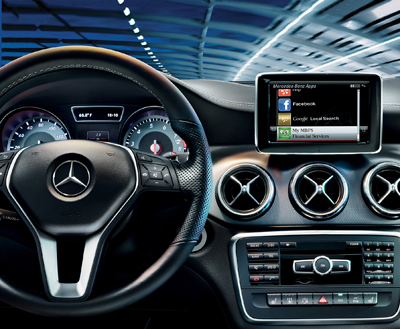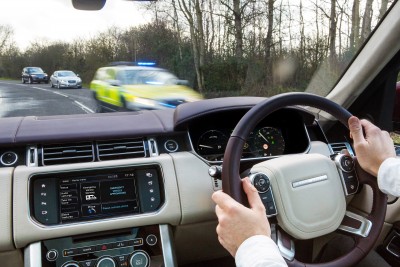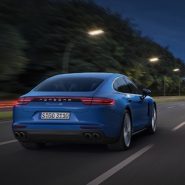With luxury vehicles equipped with so many new features, automotive product specialists are becoming increasingly significant as 24 percent of owners worked with one in 2016, according to J.D. Power’s new report.
The 2016 U.S. Sales Satisfaction Index Study shows that luxury automotive brands have an important role to fill as technology becomes increasingly progressive. Features in luxury vehicles are becoming so high tech that consumers need to be walked through how it all works and what they can do, which means product specialists are needed to arm customers with all the information they need.
“Owners can be challenged with the complexity of today’s vehicles,” said Chris Sutton, vice president of the automotive retail practice at J.D. Power. “More dealerships are employing product specialists⎯and more brands, especially the luxury brands, are requiring that the dealers have them⎯ to help the customer have a more thorough ownership experience with their new car or truck.
“Having a product specialist show the technology to the owner can really ensure the customer gets the most benefit out of their vehicle,” he said.
J.D. Power surveyed 28,979 buyers who purchased or leased a new vehicle in April or May 2016.
Armed with information
Product specialists are there to make sure owners are aware of all the technology available to them with their new or previously purchased vehicles. Last year only 19 percent of luxury vehicle owners had contact with a product specialist, which jumped up 5 percent in one year.

Product innovations in vehicles
It is vital for luxury automotive brands to include this type of help, as on average when the technology is too difficult for the owner, there is a 98-point drop in satisfaction.
With so many details going into consumers’ trust and affinity for brands, taking the top spot in sentiment is a major win for automotive brands. Germany's Porsche was ranked as the top luxury vehicle brand in J.D. Power’s study in regards to satisfaction with a score of 824.
Infiniti trails close behind at second with a score of 815, followed by Mercedes-Benz at third with an 809 and BMW and Cadillac tied at fourth both with a score of 804.

Jaguar Land Rover
While smartphone usage is on the rise for vehicle purchasing decision-making, calling dealerships is still proving to be extremely important. Forty-two percent of consumers claim to call dealerships to check on inventory and pricing.
Gen Y is proving to be the most difficult in swaying their decisions with a satisfaction score of 824 compared to the 836 score of baby boomer and pre-boomer buyers.
Luxury investments
As affluent consumers continue to purchase the most innovative vehicles, they are slowing down on classic car purchases.
Classic cars are being dethroned as the number one avenue for luxury investments, as high-quality wine makes its comeback, according to Knight Frank’s Luxury Investment Index.
While classic cars have risen in value by more than 500 percent within the past 10 years and 8 percent year over year, vintage wines are surpassing old-time vehicles in terms of popularity with consumers. A drop in the value of Bordeaux wines caused slow growth for the wine sector, but its recent price boom has caused a growth increase while at the same time the classic car market slipped below 10 percent growth for the first time in five years (see more).
"The complexity of vehicles today is requiring a different approach in how manufacturers and dealers deliver vehicles to customers," Mr. Sutton said. "The process requires more follow-up, additional expertise on the part of the dealership and communication from the manufacturer on operating features/controls.
"After several years of impressive growth in the customer experience ratings, the past three years have been flat," he said. "We’d attribute this to the growing Gen Y presence in the market and their raised expectations."
{"ct":"w97Zd3n0Bq4mVubE9rHOgb5cBtavZz3jYAm60qdmI83081\/6SZGINywdclBsP3ySofwo2jGc8S2R6Hj+WbqgR1+sQ\/dDro5JsQBVfFKv7vOTOrGCdgI6+Emjir6n8dVdTTRxVI69XYQ8zu+5Zql9KwPQ9OHjv3WcOR5KKcvQe+fvil0yCmyYmAEUGGbHX49UPIC04v3Ql5FyCkcSmeX6Xam+rrZpcg4i1FS5xdVlEiSoaNwYCdTxdL1Z7dXmf07XTc1mvcGLmgdm2FAWmOvE0YcpVXAJXfz7D4lI3OahR71HsqYTdN6U6HTJlz303ATUNO+DSS96nvYsWiGVMXKf6f15lQDUUssCm7mxQl53tYk2GPlaNyze93BmFK3A4nBb1owQrCJUq9E8g8khohRex96MN6fAhy0e6P5\/ZydM7dvkAzORnbLZmleYS0\/G4inrl4quZHkk9ppK687\/6yoZaRu3DBJ68chPyOFzNBMOU\/OTXHFFoDtWbB3klhlewoqV\/MH7TnmIj8zPqJM\/5f7ZFaWxxvm9vzu05t9T+kq+RwUQS11CHEXc+O4zaOekgIF9q4SWcvmqZKrdXEWnbwbYRCXryIU6BX2AXxVWFIFqsrc2obuOyOGCbxRd5UX6tUZt6UKvgW9qOZha63Tc\/IIT9DxOqx42X668G5\/GP4GBckNe98i4GnouKvyUAM74yw7oqH9sa3fpk8iEnoYhil0Qz9KXWw5ndRopwvXzV\/DbLSFJU7FYYq9AWj3OLEU9Fx0Xpv9Cu4uAgHRQy\/c54vSgtoRl2toP9n\/zcaJp4gCESWTUDpUhCvJHXLf3FwswtksxmFQBknfpqhQzCTInxF0wbKWoq7yHBL9tBV3O5tM3oDzHhOtbmrDeOOPc8FIrxBIH5jui\/WkSX7bcXK0pmaPeSH\/Oczp54i9AmqGixAxts+xDsr7VA51DOxTE6tjqBtUC3tF2ZyjuxHa4cTqMldEv3Xu0QQzzfoiteo\/Te7q9cPRE74CrBxrWUCP\/gSsMLSlBzXQ8y5Hs9Kc3v8pDf7vEsraaby3PEINdE4UbJQZwGB\/Hxpr2IovHszQwGj4vFk30gjMeRu0YRLDXALStTF1YRdrdtY91E8w6ScFYvFwqF\/eTpWmq4cPvpTwzje6XecmB5hr+hw2xO7CV6Et2t6WIf22ZtXCYf57cXXb+s05KssvAyocbNbWC\/LUPziHnI65mQY3OlaPNnFIOYB+PdF2K2vs9mzF9iClUFkLoov+o9vk\/H1Ps\/rFfgFq8iv\/CdnvC1iMdPUksXMoSn\/hoK0ZwqKtcTBnPe3hAhD3ehL\/z1o0JSRWHYHdp3WXi7tJJX0dVcOL6o2a+hkmFfvJ1qHMDvWPNpdvMJsK9dTmbahW9sX\/0qnXdK3FrI3+fc\/gn\/IRyl9E\/j\/Q3qnFBosUoV4GVmrVCsW4CUDm6tsVKhXXr2lxeCkga254Ot\/WCnxfd8JNKkZj83JEmpO5f12ASTz3FdVgKErzFn6rm0yVMwij+dSpCnef2\/H3EaH8ErSGATjZ+8n5AAVee\/lZavXzZWBFpfDk61T0aY+kJcGw8kKAUVanebQ9cSYjsQE28iZ+t8Ds07zSKVdgRKkLZUDa2smTapVk4dnXKzkAzbhAvnIImK3IucSpFgOU5H+yToPfd8BcXImfp5pupAT+ZQgn2yowReP5yT7yHBV7rOpS9PbsrNiXyhFcrKtRLgIGC+dP\/RvMkjr7wL+3pTi7hi\/UOJCZr+YWU2JUZ5fwawqRPS4CdTgry0Ifbj2rPhNG9PYwXzSi4HOSyFWSmOgMC8joJqoyBNuXH556jUKVQrV0dV0vNhdCXRuqi\/dbcRTvliEjCvSuofQ5SE1WGis+G7vW7Nk5A23FAh3x7qfAyIQmB3pJy+Xfz8ksXemd9Ob0V7FAvr\/pAmJRFWgALTfgkGCQjcUgubGw5eQZLVH3YlzLt8ACBJ1m9TpQSUbureyDBc7cYj3UDfyjog1VsJ1fNfyrqyM8jUq9ETaiXrhKaNi3X26\/hAzmZf\/DmpqFUJ4UsCgDXYTIivMTP2RiagCCDkaaRPmxFTjNWusxETkN41c0Oz0spdEkIkgvvgAMoUKnurH45l\/OqLrbzt9A8tzCvpJT7Uf+vZiB4lXzJf1ZLz5qYtw8OakbvW9Y585sPoS2lSbmGpjnUYV+jsGHC1DqgAERawzabkeOvXgLgnYLCn\/4At83MFO\/Y0bILu1wK0ZO0fvwXowXpuGPdmzGThsjIDMuezfci4BqaPVSnm04QqoXFJ7Jg\/T7inMvv71V0jV25jLvgggXvG9ANAgI+k2TDAy9wLvyUIsHgoSOX2ehQQdQADjGpDevpYZh8\/9ZhK6yZ\/YoIxPbQ3dpZV28xDzS0c+D05Jo74j3CHMcdtyCYmBghmt3wyzfUNAGgp2JBOAt9LYACrGSiAKF\/Fu2ps\/s3DunuFyEJz2w1at3kVuLpk2HUfUX08HCUCVfRRM\/j8RU1ZK4sxQWto9ha9ETYCLI7olX2Uypw7dBBRjtY8nWN34\/Yitg23fZc2gWA+GUKGKo0+UMg49HWM5c4c3Gtca3cFYJl\/7oAambO0tl7W8jVn16ByjiI1e1Zjukf7ssCp7aF+cGl0swC+VxZ356rZS1Gl1zQ5AMtE7baxGv\/C3s\/nU3CQaUo7mOi6KLixclGAu1r7Ue08bWlWrddF1jUhfTrpanAlowMzJydOeb17szveONhMyBNqYNs9oafXzNlb6sSvHmuLtrK51EhP1Bh+yFP1\/j27Y7RSN9oM4C62K6S14zuN9ABSInX\/44vYdAi\/4ltbPA+7E5TJUmCIplcUKx82cDPeaYIwAhg\/egsYtOtYG75SHW2UQ2TrlEPQMYRrOp70YoCggu83YX4o5JpJGbvfxpnxHkqbI\/YGU9FLoQktbbhfwQhIrsE4QDpOwoaDXk9E4SPJKymCktq7lKt0YW11S31Drkc5c6KLyCppa1d015Z1x5G5NkRN5+7H8IvWXNNMq\/NUKmmFvso55rdkMsVjDMEGfemVC1qdNnnfZRCBPhJ3Lfmtt6iLg877s6cERPGfEzsx54kT9tV1\/+cwqGaOUBvEzmSOb1Srtl9sD321Iph9n9XRXAuOQWM\/xYsf0mlBpqzma2xkUcp6082uAz6BZKpzCJTjEsUGg3yLMjYBVr8iFJ2rGrLRqfqG2Sbb+MuCVOI6U7fJmJWIsIDXsL1sowUCDGTChpPDoOMKFtWVvj6m\/cNTAG6KNMRtPXQVMF0FcKqTBguVE4iBfC3sXSfN3i9c95mLzWS4feOEVxb\/rZsNPOW4yZhR9RkeBim+xu81JHq79SiBVBAWQIT1tXdJ8\/xkKNGlMapbHQpoYXoJw3e+LaRFcoVnxNNe+ELNfvFVC\/YLOy8BFpJaPK5dcKVF8KWJ\/0BUwH8gW9h3tOYlKtOeaDavYw310px7\/3FeE3Xhlz\/wwEBv9d\/Hl1F7K1CwM6Oi6PD+TJaSA3A3QEftJlFJKFPcqtZtrrsOSG5GgmqkFetXBZrME7pNw0zqVrolgNmqRfsZCMjpVarrfXfRVlAy4tPXniwy3FEtyKtTTD5wdSZDfSPkS51MQQgwc975M8pjwkYtpxk0eadI8I0c6E8HNlTIBFME3lKJjA3+XrN\/Ws4KPQ0budKSWgOqDxlHF7NnCr6Zz1MkbKel2QOGkJNPezXAmjSuWeZBpXwsp26CF2Q\/\/wti2IIaiwqRb3mhRcsGi5ybw1fy3nZpqGYndVwxGP7\/IvhKkMaLsSsyACwgUOYy2Z3n6I\/rKYcfbCcT1ui7L339+wikfZQ5h9+1gbYvxRoftmDQn6Kuz\/t2sQwUwnvtuY\/OjahjMw17FvdaG\/Bim74XDU0tkcVIniTTZ07jcYVH4qyj6KTH59bpJ2R\/oGFQ60CWG5CiYz7RsitfrJaZAt8my1IJFM+wlNuHMYQGIL7sLDOiCHF3x2T0wNt+28K06fSOiEokvruF\/0dh9x4yDd47LmbHsHm+m339pBzOgkJQy1Dq60B3E77HSAtla0NhQlcdM1sPrKPuNg\/cpbezIdSlAzBNlo6ho\/\/jhTIUds4yCdgPIg+RN8NKA\/QoRNiwdAj\/cTpYchsADc+hIguL6KxL\/kmUVy5zFk22vUI\/Ayq1CcAli+07ortHls0XOOQALqxnSAie8MllwEtNLUlEslR96Ahoo7dQ9yRPRZ4TboBPLySVbAoCSqgk8\/jw+VisZHn+VF7R1aQrOTweKoB7R9senS8xCBErsT+JPZume3cBjATjBgg+OyZCAt84TfHpVF8T5zlRY7WBbnW1JNRLleMU7tLKlRZFctbp1Uczb7TUbIevhqpoVTQNwNexV7r0B3EWEZAlSzquTY5VnV1q2UZbg2s3tL6aSgExsUZ+ezusLmtxOAWXs0vYPgRWST+h+qdqSSlHAMoVzYtPXkfThh0dd\/bmGOKiiGJTW92J8E0YSV9t5DtlcO95BASLR895JfhDrBnccXk2ylcI0D+EgfkePRC9Ua7EzRHzevlLpNomoI9jaao5XeMPzWBqsGepzXvzavEFHldNJyUs273+358YjSGXaEmrYaLPLMh6CH6nIPuZHDjhV1aU0XqI6nx3zcqoPadCME4Il1M5\/1mUIk6N+3FI6XuncGeIg+wxQAjhQKerB7u0YaW5QdItgzTzomotScKypEanDsEdsbxQQKVExNQVvzbpgBV2t+8LimeURsipC5ucEup86VHP+vnJNN4XAQ2HmWUxIReUfvkrVLGB8cHgBap7LEl9xLgNiW2g1iigBMfhJ8yil\/UxLgLb68x5L9AXeTNa9zoRs0EECpqSRNRKvwCNmbdgVosn3gNC4V1tVnrqiUL+lBbcqjGFntlztD+SV\/YEX8SwXm7v3ZFTML2xuHiefd2xkj65zXCFDUHkCYt86igqET9k7nO5dmvuvz21Y6pKtfu4RRRpHqgeM+FUHRUUNBMB0Z0qT0Co4GvdzGxuvL2MZs1FXPT0LTArQ8s9EAzJM8fr4bMewQaBGkmTxjdsXrddm8XliuUrhqu8yFB3oqTI3XPCP+HuCur6ObAQ8\/\/IVmVb1gCiMlLui336L7UczHSmbjkC0nipAEx\/dkpqsKL4N2Pvto0iyXx4vfFFOogwstVvE8HDYWTf9BKVEWwtRA3EKoL3+WNGvaKChXNO02kvkOsz+mWphShxQ\/9W6NIRNRNNBjDXDIKWo45wKfrNZc7\/wLphrK6h8ZPyORk+gZ\/bERcqAVUqqSUc6RjjENFW0RYsfwQ+tYkAYtHUlBjPq9UwRKbwf5QhUVPkLsNGhQUnW2cUqIm7tJp7H4ZTQMzP6FmbEhFQCoZuNpLGMZBbflXq849LbCoyYQZCenlN3S3vsCV0bxruZxakzK9Jyb+N\/tx6CkE+PG1OQTEtI3k0PiRxYdvD1XoV1\/gaAVK1dR4RHaJtMjhgwDHsDsI0iV9ECLPLRU5wmpL4OCAvwdltxBp7n5cqoSQSyI4p3rlIbf6leyyJ9+5sa5xbkbKhwIwMyUA5nGBD2EUZkGcTNuDyCLzzlsY1siCHDnVFHEhxTS65RYbKi9P+8iCF1NpmjQQaunzMuU+FfKQS\/pL86CctFvZCJ5uQbYAwWJkoqIFV6AZvuUITAr20C6dDzK+GZ4GWMa6LeKzzY3P8jTm4ACnzFsgpDoV2hE7D8ofxAFiB1uyFQWOlDpRYV0MtaJTqWjWM4+aO9Mfk7WTtWyAPrkJnj2VpxfjsUP75\/maLCLxQhuI4Y2F3EF646KZPA\/uf3d+N0yhAXAlcxN5+Ye1HKFG9q7IC0w1M0gdeR2zwITnUZik\/1MLg3RgOczg0pWkfh0hs\/izKysDMgjNgYdoKkB+cSYlrGW92QeNgpg\/GT7+H16SArMBHkULqixgIN6Egf1qYXBaf4rBWCB+X6FHjSFigFRfqUJZ8+dMftAFTwcr7T1TWupPLgzXoJh\/doEWkioAtL\/cIY+H9UjdXZS3o62QQL66bzI8y9gVSzMAwKw1AWLpGcASOpBQg4mxVRabcEwDKMJhyU2m7I7+en5V3b7Ped4mKLSJ+hau1Yvnc8ZtjKwwnK+cxX4+iM9+2yllLZRdpnpMvEesowgfKxYWDEKh4vIulmVmwZtyTwRgtBh9r5joC+YMQhEN17249Kca\/89RVPPVE\/v5Op9adEIpfCBsJc5i8MIWDVS97QtEIGhRDLiEBqldctM+tsTfroLkZ+u2EM\/LzEV9\/AWyAmgr1Ei7JuQKziMhmFFjn\/0cnqtAilVXQ4K+wJIB5eQrqYzqVcavGBc43+hkjfWwlXMRznY5niRV1RT90bwr+oIUUa9yjw2v7MN04kjNTyz5S\/b\/eqtDdyT6AMY9LY2wL0MzoM8tuqx3\/R4G7AyDFASB4jOqxym23PAY2d8BMC1FMGVC7Ic+pdCf4HFlI7mW8U1tkk63TVaadHx7Yxe5GB0Ha3DX2brRHILC71y0YkpV6JiQdBLgPUelocJOkcwqesibfBIkxwfmwEoa4rd4MeZo6SFmWnBgvI+8lkVDBjBOALXZlAvOpE98gOooWUnq4NucmerNggdKvQZIXt72dk7jQDkC9n+Br6uqE+LJyt4rvMeoNNQg+QtSlxmqPuwss5LYpyQnNh488BBBoeKesqiHwFXHtjMKxGifslxoCOyWMnFvWioYrMYdfnD4FBSIiY5K\/\/l+Xl6vkIi5x\/nKrSK0P2Oj\/CNmabUT+TVozVjFHccmymmfxIrnBWZn7hzNDyt\/CnA+shktjx2ZGC4+92obGA0kzFY6jhN45F38IAi9rHx273yauZAUWoy\/KdpqD3Xak\/zDaFx8hFwry8darwBH3LrdKHm97loAnq9HZPU3TmjxjTKlwmFEyyZOLJWOmw5Uitt+VbuYatEezipw2Ks3gzPRhUPxfSp7W0tPZuTP9zI5fhKslnR2J6\/t+lqlnSl\/U\/vzMWOzb34hjErXCMhKFmLSC6CysgRYElCyIZ5DNpr+YNZLZoi2Cz9xJb4PlXNV2HbLS5urRKxn6mx9perzwmc9u9mRCpwRtFteBh+zSNO72XRTKbemhuwMssj16tlnOY3FQ1sGMcX6PqoSUX9hMb9mmJsIRkft7Tl36CNR","iv":"68d86faa5679615f41521a56d37ae3e8","s":"1850c5ec056fc91f"}
